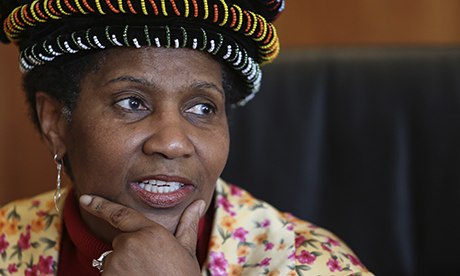
Violence against women is so endemic it is impossible to work on any issue relating to women without it being addressed, according to the head of UN Women.
Speaking in the runup to a high-level summit on protecting women and girls in emergencies, held in London on Wednesday, Phumzile Mlambo-Ngcuka, executive director of the UN agency, told the Guardian: "I don't think now it is possible to work with women and not have this as a central issue because it is crucial. Women are facing domestic violence, and violence affects young girls, through early marriage, though thankfully we may finally be turning it around on female genital mutilation.
"Poverty is a form of violence against women as well. It's an issue not just for us [UN Women], but all agencies, and civil society. We're calling for everybody, men and boys as well, to make it a priority as well. This has got to be something we all work on."
Mlambo-Ngcuka, who was appointed executive director of UN Women in July, replacing Michelle Bachelet, praised the UK government for its leadership in addressing violence against women. The Department for International Development, which is hosting Wednesday's event, led the talks for a new resolution on conflict prevention, resolution and peace-building, which was passed by the UN security council last month. Meanwhile, in 2012, the Foreign and Commonwealth Office launched its preventing sexual violence initiative to prevent and better respond to sexual violence in conflict and prosecute perpetrators.
The high-level meeting, to be attended by UN agencies, government leaders and NGOs, is expected to result in a call to action to ensure protecting girls and women in emergencies is a priority and to agree on policies to bring about lasting change.
The mass displacement that comes during conflict or after natural disasters often leads to a breakdown in social structures, which can leave women more exposed than men to sexual violence. According to a report this year on the civil war in Syria by the International Rescue Committee, sexual violence against women and girls was a "significant and disturbing" feature of the conflict. But because they were refugees many of those who had been attacked had been unable to access the physical and emotional support they needed.
In the Philippines, the UN office for the coordination of humanitarian affairs estimates that of the total number of people affected by Typhoon Haiyan, 47,600 women aged between 15 and 49 are at risk of sexual violence.
Mlambo-Ngcuka, South Africa's former deputy president, said more attention needed to be given to the practical responses to an emergency in order to protect women. For example, building toilet blocks or water points that are not situated far from where people are living and are well lit. But she added that after the initial throes of a crisis, women needed more longer-term support to ensure their rights are upheld.
"Organisations like us … will be working with governments to see that the impact [of an emergency] is not disproportionately borne by women," she said.
Women can find it more difficult than men to "re-establish their identity" or uphold their right to land if documents are lost during a disaster, she said. And sometimes the extra responsibility involved in looking after orphans, which often falls to women, is not acknowledged by governments or local leaders when resources are being distributed. "These are some of the details that could make the post-crisis life of women more bearable if we pay attention to them."
In times of fighting, such as in areas of the Democratic Republic of the Congo, where an estimated 40 women a day are raped in South Kivu alone, women must have access to appropriate health services, such as emergency contraception, said Mlambo-Ngcuka, although she acknowledged that access to abortion as a result of rape in conflict was a fraught topic.
Explicit mention of ensuring women who have been raped in conflict have access to safe abortions was included in the outcome document of this year's UN Commission on the Status of Women, but it came with the proviso that abortion services have to be permitted by national law. Many governments still do not allow abortion or do so only if a women's life is at risk.
Mlambo-Ngcuka admitted this "makes it a bit tricky", and was not a "position we want to put women in. Unfortunately, it's not as perfect as one would like to be," she said. But she added that women's organisaitons were critical for implementing change. "We're not going to win the battle in the offices in New York. The battle will be won in the countries where women engage and confront their governments."

